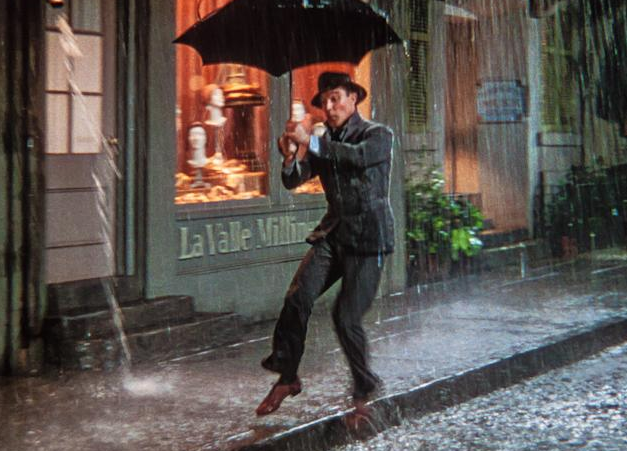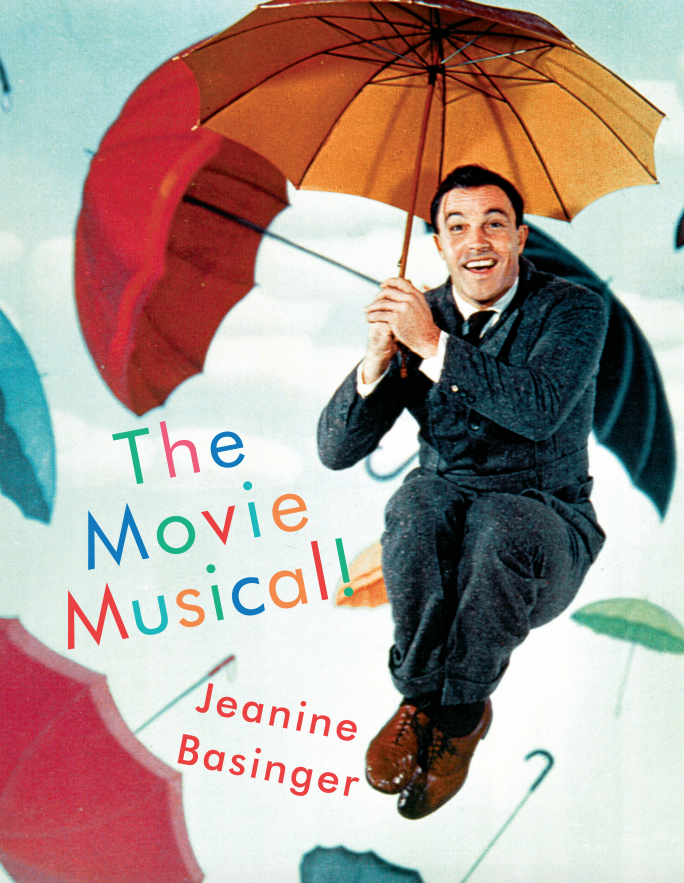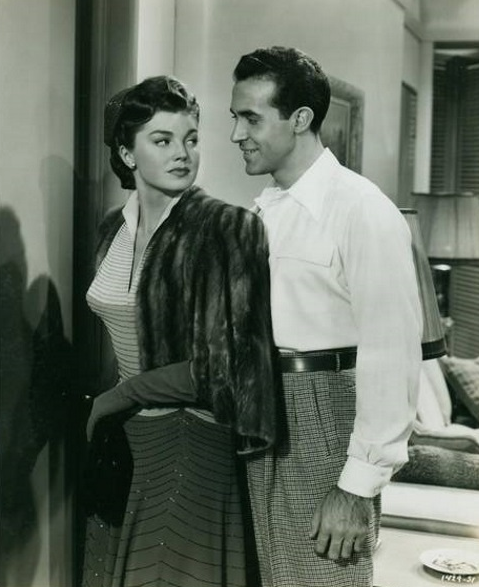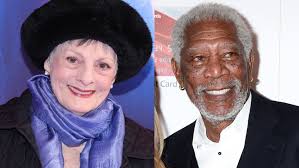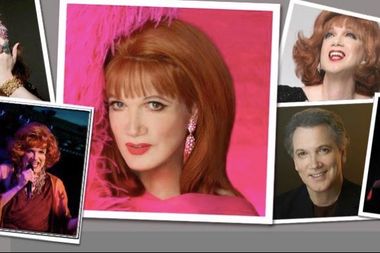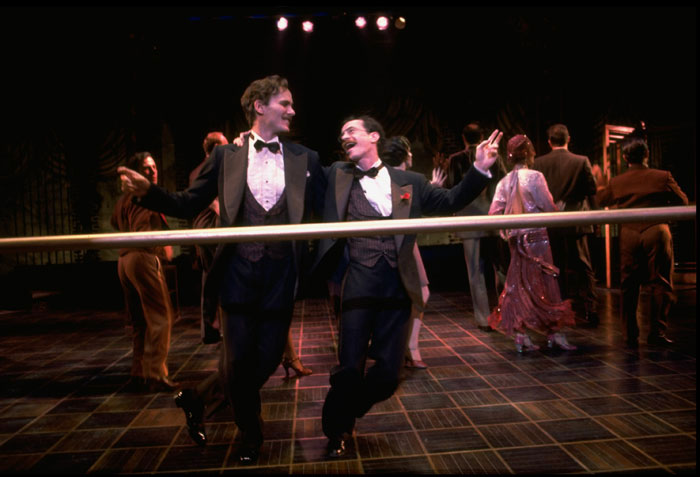An Amusement Column


Happy Hundredth, Marge!: From Katharine Buffaloe-Harris, Phillip Arran, Richard Skipper, Larry Fuller, Ernestine Jackson, D040 President John Sefakis, John Canemaker, Norton Owen, Mindy Aloff, Rex Reed and John Anthony Gilvey
by Harry Haun
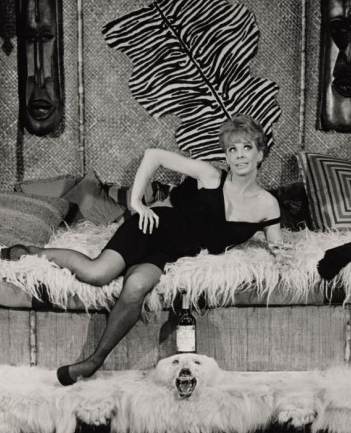

Gwen Verdon as Sweet Charity knocked over by a feather
MUSICAL MYTHS AND MISSTEPS: Merely Marvelous: The Dancing Genius of Gwen Verdon, the documentary anecdote to the abrasive Fosse/Verdon miniseries, has been performing swimmingly on Amazon Prime Video for the past six weeks while producers ponder its DVD release. . . . Embedded in its narrative are a couple of jaw-dropping revelations you’d never have suspected of Gwen Verdon: One, during a performance of Sweet Charity on Broadway, while hiding in the clothes closet of her movie-star pickup, a feather from his down coat flew loose and found its way around her vocal chords, altering her voice for the rest of her days. And two, for that iconic title sequence in Singin’ in the Rain, Gene Kelly splashes and sloshes about gleefully in the rain-splattered street gutters, but his click-tapping was done later on very dry terra firma by Gwen and then dubbed onto the soundtrack. . . . On Nov. 8, Columbia Records will release A Legendary Christmas: The DeLuxe Edition, which features a politically corrected Frank Loesser song, revised by John Legend and Natasha Rothwell and sung by Legend and Kelly Clarkson. . . . After almost seven decades of public consciousness, Loesser’s lyrics struck the #MeToo movement as a prelude to date-rape, and “Baby, It’s Cold Outside” was stricken from the roster of Yuletide tunes. Now, altered, it’s back. Its previous debut was in another vintage MGM musical, Neptune’s Daughter, and, yes, Ricardo Montalban did do some heavy Latin breathing with it in the direction of a primly departing Esther Williams—a sequence that was comically contrasted by another scene where an equally forward Betty Garrett did the same to a flustered Red Skelton. . . . In June of 1999, Williams made one of her last public appearances—a very funny one at a star-stuffed event called “Carnegie Hall Celebrates the Glorious MGM Musicals”—and revealed that “Baby, It’s Cold Outside” was a last-minute substitute for the hoped-for big hit which Loesser had written expressly for Neptune’s Daughter and which the bluenose censors of the time would not permit on the screen—namely, “(I’d Like to Get You on a) Slow Boat to China.” Their objection was to the parenthesis portion of the song; they contended that “get” was a euphemism of the F-word. (Williams regaled the Carnegie crowd by musically illustrating their point and singing “I’d like to f— you on a slow boat to China.”). . . Loesser was giving a romantic reading to what was poker parlance for a player who constantly lost; in that context, getting the guy “on a slow boat to China” would give other players all the time in the world to clean him out. . . . Without words, the song stayed in the picture as background music for a swimwear fashion show. With words, it became an enormous pop hit in 1948 and later well served Rosemary Clooney, Bing Crosby, Ella Fitzgerald, Frank Sinatra and that crowd. . . Silenced by the censors, Loesser had a big-hit hole to fill in the picture, so he rummaged through his old trunk songs and came up with “Baby, It’s Cold Outside,” which he and his first wife used to sing at parties. (While they were married, wags would refer to him as “the Loesser of two evils.”) He wrote that song in 1944, but it emerged five years later as the Oscar-winning Best Original Song of 1949. . . . The Academy’s hard-and-fast rule for this category is that a song must be written for the movie it appears in, but a couple have slipped by the Eligibility Police. . . . “The Last Time I Saw Paris” by Jerome Kern and Oscar Hammerstein II, won this award in 1941, even though it was published the year before and then put in MGM’s Lady Be Good as a sentimental cinematic gesture to Nazi-infested France. Even composer Kern questioned the correctness of this and said he voted for “Blues in the Night.” . . . The winner in 1975’s Nashville, which had a country-western score composed by the whole cast, was “I’m Easy,” which Keith Carradine had written to Shelley Plimpton when they were doing Hair on Broadway. . . . The Academy’s vigilant song-sleuths have kept the category free of trunk songs in recent years. Alberta Hunter, the late late-blooming Cookery star, was nixed a 1978 nomination for “The Love I Have for You,” which she sang in Remember My Name (but actually wrote during World War II—the title line sounds a shade like “The Very Thought of You”). It’s a song rarely heard since Hunter’s passing, although Ernestine Jackson resurrected it wonderfully at the last Theater World Awards ceremony. . . . And when Dancers Over 40 got together to celebrate Marge Champion over 100 (47 days over, at the time of the event), Jackson was on hand to sing “Someone to Watch Over Me,” the Gershwin song Marge sang in 1955’s Three for the Show. DO40 (as the group likes to call itself) threw a real nice cake-bake for Marge. Her portrait adorned her birthday cake. Alas, she was not present to partake, but a DVD of the event was sent to her, featuring a Happy Birthday finale delivered with much brio by the likes of Larry Fuller, moderator Richard Skipper, critic Rex Reed and Gower Champion biographer John Anthony Gilvey. . . . Splitting the DO40 bill with Marge’s 100th was Joseph’s 50th (as in Joseph and the Amazing Technicolor Dreamcoat). The original Joseph and Narrator from the ‘90s revival, Bill Hutton and Kelli Rabke, nailed their big numbers without a bauble, and the assembled cast (Phillip Arran, Lorraine Barrett, Philip Carrubba, David Friedman) tore through two ensemble numbers without a false move. Muscle memory is everything. . . . Just when you think there’s nothing more to mine in a genre, along comes Jeanine Basinger, and she strikes gold. Knopf brings her latest gold shipment to market Nov. 5, and The Movie Muscial! earns its exclamation point. This in-depth exploration of such folderol is real fun. Her analysis of her idol, Fred Astaire, and his “perfect” partner, Ginger Rogers, is a critical love-offering: “Astaire and Rogers were the promise that movies made to ordinary viewers: inside you, behind your looks, there is something else, something desirable and special and eternal. Like Fred and Ginger.” When dancing with Rita Hayworth, the chemistry is electric; when conversing with her, their magic evaporates. When Eleanor Powell goes into “Begin the Beguine,” Basinger sees in Astaire the satisfied smile of a champion who’s met his match. This book is a must-have for all with a song-and-dance sensibility.
BACK TO SQUARE ONE: The Acting Company has recruited the whole star-cast of Alfred Uhry’s Pulitzer Prize-winning Driving Miss Daisy, both of them–Morgan Freeman and Dana Ivey—to do age-appropriate reprises of parts they started in 1987. It’s for a one-night-only benefit reading Nov. 11 at The Kaye Playhouse. There is a third role in the play, a supporting character–her son, who creates and then referees this uneasy alliance—and it will be played by Walter Bobbie, the original understudy for the late Ray Gill. . . . It was The Actors Fund that cranked up this concept of reunion concerts for single-night benefit performances—first with Thoroughly Modern Millie’s 15th anniversary last year, then with [title of show]’s 10th anniversary earlier this year—and now it has two more on the immediate horizon. . . . Best it be said up front: Linda Lavin will be back for seconds in The Tale of the Allergist’s Wife 19 years after its opening playing a different role. Instead, her title role will be played by Charles Busch, who knows all the words, having invented them himself. This was his first mainstream play, and it was greeted with welcome-to-the-club Tony nominations for him, Lavin and Michelle Lee. She, Tony Roberts, Anil Kumar and the original director, Lynne Meadow, will be participating in the staged reading at the Samuel J. Friedman Theater on Monday, Nov. 18. . . . How’s this for “immersive”? Two 30th anniversary concerts of Grand Hotel benefitting The Actors Fund will be held Monday, Nov. 11, at 7 p.m. and 9:30 p.m. at an actual hotel—The Yotel at 10th Avenue and 42nd Street—specifically, in the more expansive Green Fig Restaurant located off the fourth floor lobby and just down the hall from The Green Room 42. That room’s innovative program director, Daniel Dunlow, will be playing the action all around the room so there shouldn’t be a bad seat in the house—plus, he’s adding lights, sound and even a stage area just for this event. It will be known that night as “The Yellow Pavillion,” like the nightspot in Grand Hotel. . . . Walter Willison, who endlessly arranged and rearraged those golden chairs on Broadway, has moved up to the solitary director’s-chair originally occupied by Tommy Tune and is staging this concert edition, as he did five years ago at 54 Below.. . . John Schneider, who played the Baron on Broadway longer than any other actor, is coming in from Tennessee to join original cast members Karen Akers, Timothy Jerome, Ken Jennings, David White, Keith Croningshield, Charles Mandracchia, David Jackson, Penny Worth and Willison. . . . Imported for the event are Judy Kaye, she with the two Tonys, and Sachi Parker, she with the Shirley MacLaine pedigree. . . . The concerts are dedicated to the memory of Liliane Montevecchi, who was Tony-nominated for Garbo’s old “I vant to be alone” role, the ballerina Grushinskaya. Tony nominee David Carroll, Tony winner Michael Jeter and John Wylie have also passed. Wylie’s the lobby-lounge doctor who blandly (and blindly) observed, “Grand Hotel. Always the same. People come, people go. Nothing ever happens.” Wrong!




